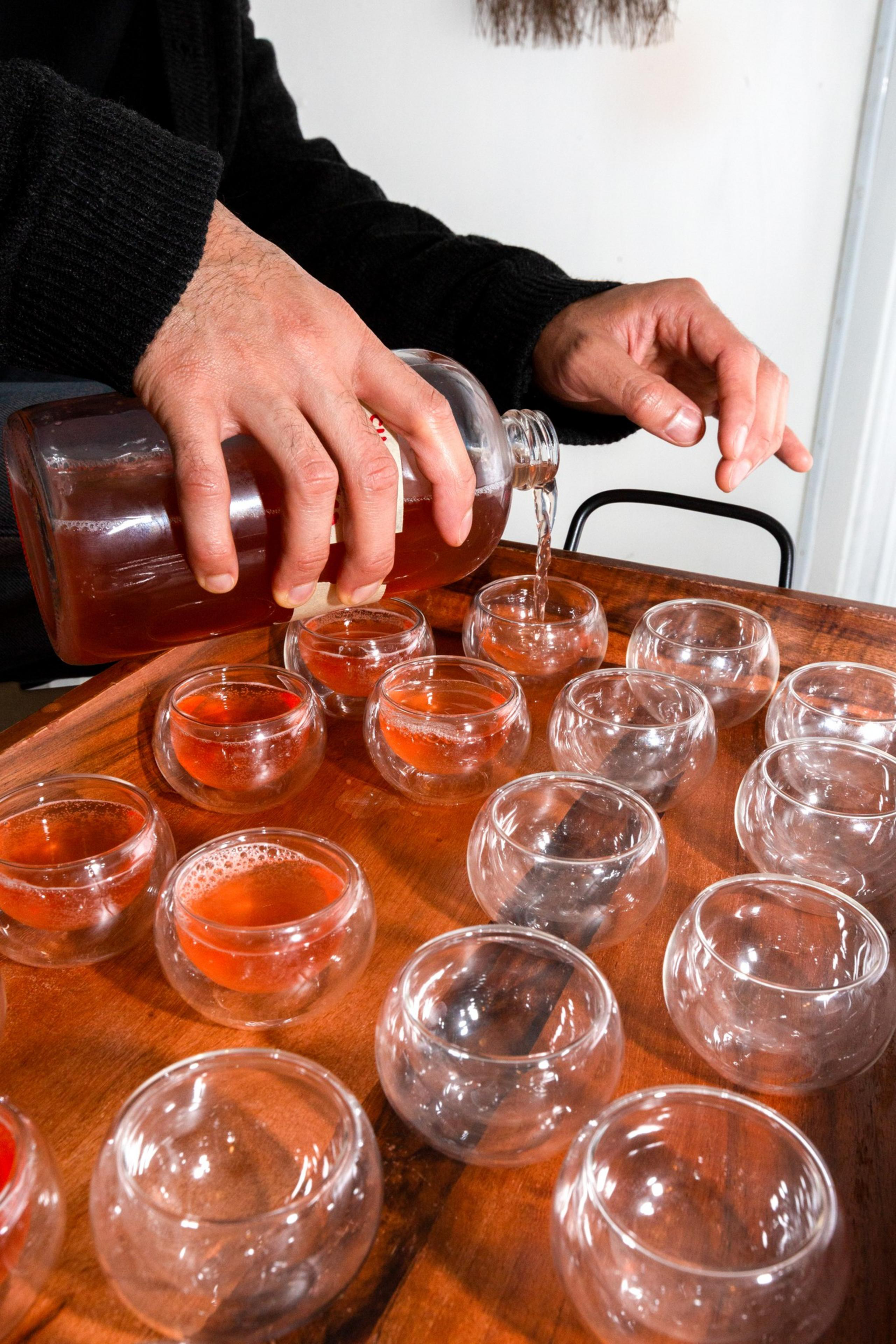It’s 10:30 a.m. on a Saturday in September, and Rooh, a Michelin-recommended Indian restaurant in SoMa, is pulsing with DJ beats. Hundreds of people are drinking and dancing as a bubble machine sprays the delighted crowd. The inhibition-loosening elixir fueling the party: chai tea.
Welcome to San Francisco’s inaugural Chai Rave, a mostly alcohol-free party that is the brainchild of Mandeep Pabla, president of Radio5 Events, a Bollywood party production company. The 400 people in attendance were the lucky ones; tickets sold out within a week, with 317 marooned on a waitlist.
This isn’t just a party. It’s part of a broader shift in socializing across the Bay Area. There are now invite-only tea parties hosted by AI startups. Gongfu cha tea ceremonies at Zuckerberg-themed raves. Teahouses at Burning Man. Tea sommeliers at Alchemy Springs sauna garden in Nob Hill. And countless impromptu tea times at cafes and teahouses around San Francisco.
The tea craze can be attributed to the wellness-driven zero-proof movement, as an antidote to the loneliness epidemic, and as a reaction to the loss of late-night coffee shops, which once drew generations of San Francisco youths.
“All we’ve known in our industry is the nightlife, [but there’s] a new emergence of the daytime economy,” said Pabla, who produced the Chai Rave. (opens in new tab) Attendees were already lining up when doors opened at 9 a.m., he said. The restaurant served alcohol, but Pabla estimated that fewer than half of those in attendance partook. “They’re not here to get hammered … [but] to connect with people and have meaningful conversations,” he said. “Gen Z is definitely wired differently.”

In Berkeley, Joyce Wong, 20, a rhetoric and prelaw student, has joined tea rooms at gatherings like the VibeGala, an annual East Bay party, and a soiree for Gabe Bankman-Fried (Sam’s younger brother). The prevalence of tea at social events seems like a recent phenomenon, she said, but noted, “I am extremely young and have a small dataset.”
She was so inspired by tea parties she has attended that over the summer, she borrowed her parents’ china and hosted one for around 20 friends. She served 15 varieties of tea and pastries, and played light jazz. “We sat around, drank teas, and caught up. … [It was] very chill and a moment to breathe,” she said. She hosted her second tea party in September.
Jenny Shen, a 32-year-old designer at Pinterest, channeled her own obsession into a startup, Teya Tea (opens in new tab), which sells tea bags. She’s hosting a tea-themed party Sunday at Jilli, a Korean tapas bar in the Mission. There will be craft tea tastings, tea-flavored pastries, and cocktails made with you guessed it. The $48 tickets are sold out (opens in new tab).
“We are making tea the main character, to modernize it and make it fun for everyone,” she said, pointing to her zero-proof muscat-grape “wine spritzer” variety. “Some people think tea is intimidating, [but] it can be easy; it can be social.”
Whitney Vangrin, a multidisciplinary artist, has embraced the salon approach. Since 2023, she’s run the pop-up Night Tea, (opens in new tab) an alcohol-free gathering that connects artists and neighbors over shared food and drink rituals. “Tea feels familiar and grounding — a communal ritual that’s constantly reimagined,” she said.

In Oakland, 13 Orphans, a mahjong speakeasy, serves tea-based elixirs provided by Teaphile, (opens in new tab) a local collective. Founder Annie Chen said her audience is primarily Asian Americans “trying to build their own relationship with tea … without their parents.”
Some see tea events less as a cultural movement and more as a much-needed late-night third space, where young people can hang out or get work done.
“People are so frustrated that SF cafes close too early,” said Samantha Ouyang, 21, an undergraduate at the University of Pennsylvania who splits her time between Philadelphia and the Bay. In July, Ouyang piloted Elsewhere, a late-night specialty tea and coffee pop-up for “people that don’t have conventional 9-to-5s,” in the Rincon Hill office of a venture capital firm. She served three lattes and three teas, including the Instagram-famous blue butterfly pea Thai tea.
“We had 400 people and a line out the door,” she said. A permanent Elsewhere location on 3rd Street is slated for 2026 (the landlord agreed to a six-month pilot); it will serve tea and pastries and stay open till 2 a.m. “We are riding the wave of no alcohol,” she said, calling it “just a late-night spot to chill, to work.”
Many of the emerging spaces also serve coffee, but organizers say the Gen Z crowd is gravitating more toward the tea. “I love coffee, but chai tea is more of a vibe thing for me; it’s more social,” said Nikita Singh, 33, a software engineer from Rincon Hill who was at the Chai Rave.
Gen Z’s jump on the tea train makes Oshan Anand very happy. The founder of events company Tea Tribe (opens in new tab) and the Memetic Literacy Lab, a nonprofit combating misinformation, Anand has spent 17 years steeping in Bay Area tea culture. He runs the Key Haus teahouse (opens in new tab) at Burning Man and says he has served tea at Google’s Halloween party and once flew to Aspen to perform a ceremony for a tech billionaire.

“Tea culture builds community and cultivates authentic connection and communion [in] a way that other social activities don’t,” he said. “When people are grounded and centered … they connect on a deeper level.” He’s raising money for Mystic, an alcohol-free, tea-based nightclub planned to open in 2026.
The Chai Rave, too, is becoming permanent. The response to the first one was so big that Pabla has expanded to San Jose and San Diego. The next SF Chai rave is Nov. 8. (opens in new tab) “For years we’ve been asked to expand into the Bay,” he said. “This is going to be permanent. We’ll be there every month.”
